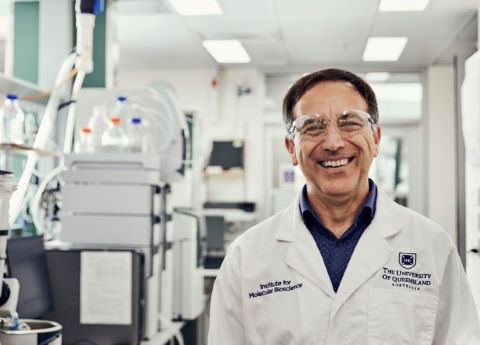
University of Queensland researchers have found metal compounds could be the answer to the growing problem of drug-resistant fungal infections.
Associate Professor Mark Blaskovich, Dr Alysha Elliott and other researchers from UQ’s Institute for Molecular Bioscience, together with Dr Angelo Frei from The University of Bern in Switzerland, led a group of collaborators which found one in five metal compounds analysed displayed antifungal properties.
Dr Blaskovich said the compounds, a particular class of molecule, showed potential to be used in the development of much-needed antifungal drugs.
“Fungal infections cause an estimated 1.5 million deaths a year and are especially dangerous for people who are immunocompromised, such as chemotherapy and transplant patients,” Dr Blaskovich said.
“As well as bacteria becoming resistant to antibiotics, fungi - which cause meningitis and infections of the skin, lungs and bloodstream - are becoming resistant to known treatments.
“There are only 10 antifungal drugs in various phases of clinical development at the moment and not all of them will pass trials to make it to patients, so we urgently need more options.”
 The team had previously shown metal compounds like the platinum-containing anticancer agent cisplatin have antibacterial properties, so carried out the first large-scale screening to investigate their antifungal potential.
The team had previously shown metal compounds like the platinum-containing anticancer agent cisplatin have antibacterial properties, so carried out the first large-scale screening to investigate their antifungal potential.
“We found 21 per cent of the metal compounds screened showed antifungal activity – compared to only 1 per cent of the 300,000 non-metal compounds screened previously,” Dr Blaskovich said.
“Encouragingly, those with the highest antifungal activity also showed low toxicity in preliminary tests.
“The beauty of metal complexes is their three-dimensional structure, meaning they could work in different ways to existing antifungal drugs and overcome resistance.”
Dr Blaskovich is co-founder of Community for Open Antimicrobial Drug Discovery (CO-ADD), which collected the compounds and conducted the initial screening for this study.
“CO-ADD offers free testing of new compounds from research groups around the world, as well as a searchable database to accelerate the discovery of antibiotics and antifungal drugs,” he said.
“We’d like to see more researchers submit their metal complexes for antimicrobial testing so we can speed up the pipeline to produce new antifungal drugs and prevent a resistance crisis.”
The research was published in the journal JACS Au.
Above left: Associate Professor Mark Blaskovich.
Media: Associate Professor Mark Blaskovich, m.blaskovich@imb.uq.edu.au, +61 (0) 414 955 380; IMB Communications, communications@imb.uq.edu.au, +61 (0) 405 661 856.
.jpg)









